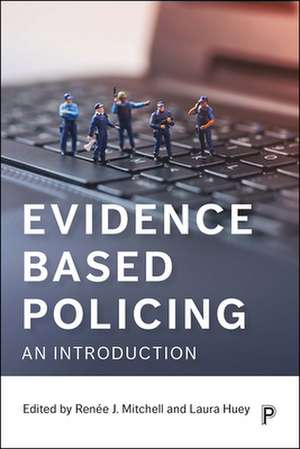Evidence Based Policing: An Introduction
Editat de Renèe Mitchell Autor Laura Hueyen Limba Engleză Hardback – 4 dec 2018
Over the past ten years, the field of evidence-based policing (EBP) has grown substantially, evolving from a novel idea at the fringes of policing to an increasingly core component of contemporary policing research and practice. Examining what makes something evidence-based and not merely evidence-informed, this book unifies the voices of police practitioners, academics, and pracademics. It provides real world examples of evidence-based police practices and how police research can be created and applied in the field. Includes contributions from leading international EBP researchers and practitioners such as Larry Sherman, University of Cambridge, Lorraine Mazerrolle, University of Queensland, Anthony Braga, Northeastern and Craig Bennell, Carelton University.
Preț: 780.18 lei
Preț vechi: 1013.22 lei
-23% Nou
Puncte Express: 1170
Preț estimativ în valută:
149.29€ • 156.26$ • 124.25£
149.29€ • 156.26$ • 124.25£
Carte tipărită la comandă
Livrare economică 31 martie-14 aprilie
Preluare comenzi: 021 569.72.76
Specificații
ISBN-13: 9781447339786
ISBN-10: 1447339789
Pagini: 208
Dimensiuni: 171 x 241 x 20 mm
Greutate: 0.64 kg
Ediția:1
Editura: Bristol University Press
Colecția Policy Press
ISBN-10: 1447339789
Pagini: 208
Dimensiuni: 171 x 241 x 20 mm
Greutate: 0.64 kg
Ediția:1
Editura: Bristol University Press
Colecția Policy Press
Notă biografică
Dr. Laura Huey is the Director of the Canadian Society of Evidence Based Policing and (Full) Professor of Sociology at the University of Western Ontario. Dr. Renee J. Mitchell is a Police Sergeant at the Sacramento Police Department. She is a Police Foundation Fellow and is a Jerry Lee Scholar in the Institute of Criminology, at the University of Cambridge.
Cuprins
Introduction ~ Renee Mitchell (Sacramento Police Department) and Laura Huey (University of Western Ontario); Part 1: Key ideas; What is Evidence Based Policing? ~ Laura Huey (University of Western Ontario); The Triple T Approach ~ Lawrence Sherman (University of Cambridge); Strategic Crime Analysis to Support Decision Making in Evidence-Based Policing ~ Anthony Braga (Northeastern University) and Riley Tucker (Northeastern University); The Legal Framework for Evidence-Based Policing? ~ Seth Stoughton (University of South Carolina); Part 2: Research methods; Systematic Reviews in Policing ~ Peter Neyroud (University of Cambridge); From Ivory Towers to Officer Inclusion: The Emerging Paradigm War for 'Evidence' in Policing' ~ Emma Williams (Christchurch Canterbury University) and Tom Cockcroft (Leeds Beckett University); ‘Not all evidence are created equal’: On the Importance of Matching Research Questions with Research Methods ~ Barak Ariel (University of Cambridge); Conducting Open Research in the Policing Field ~ Craig Bennell (Carleton University) and Brittany Blaskovits (Carleton University); Twitter, A New Tardis for Policing? ~ Emma Williams (Christchurch Canterbury University), Ian Hesketh (U.K. College of Policing); Part 3: Current and emerging areas; The Trials and Tribulations of Evidence-Based Procedural Justice ~ Sarah Bennett (University of Queensland) and Lorraine Mazerolle (University of Queensland); Hot Spot Policing Made Simple ~ Renee Mitchell (Sacramento Police Department); Part 4: Experiences in EBP; “In My Experience” and Other Challenges to Front-line Adoption of EBP ~ Jerry Ratcliffe (Temple University); Police Science, Evidence-based policing and the Challenge of Ownership ~ Peter Neyroud (University of Cambridge), David Weisburd (George Mason University and Hebrew University); Hello from the Inside: Pracademic Views on the Design, Implementation, and Monitoring of Randomized Controlled Trials ~ Greg Stewart (Portland Police Bureau), Josh Young (Ventura Police Department) and Renee J. Mitchell (Sacramento Police Department); Moving to the Inevitability of Evidence Based Policing (EBP) ~ Peter Martin (Queensland Police Service)
